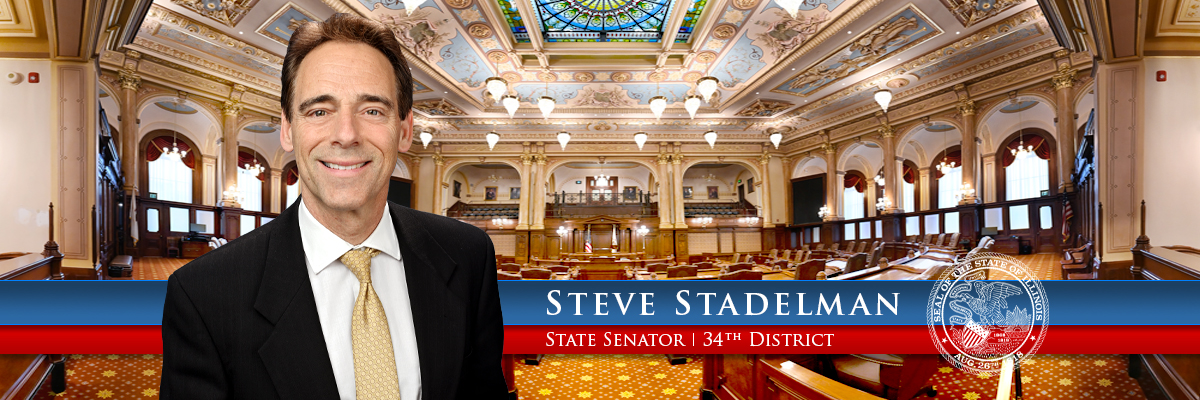- Details
- Category: Latest

State makes good on financial commitment to Machnesney Park
State Senator Steve Stadelman announced this week that the state is reimbursing the Village of Machesney Park for a boat ramp built on the Rock River in 2015.
“This payment, of course, should have occurred long ago," Stadelman said. "But the release of the funds now proves Illinois is turning a fiscal corner and finally keeping its promises to communities like Machesney Park.”
Illinois Comptroller Susana Mendoza issued a check for $200,000 to reimburse Machesney Park for a grant awarded in 2014 under the state's Boat Area Access Development Program but frozen after Bruce Rauner became governor in 2015. According to Machesney Park Mayor Steve Johnson, the ramp has lived up to the intent of the state's grant program, which was to improve access to Illinois' lakes and rivers. The ramp provides the added benefit of helping law enforcement respond more quickly to emergencies.
“The boating public and first responders have really appreciated the boat launch, as shown by the amount of use it gets,” ohnson said. “It would not have happened without the 50-percent grant funding by the state, and we appreciate Senator Stadelman’s help in seeing the final payment through to us.”
Stadelman urges Goodwill grads to keep believing
Citing the early life and career disappointments of Abraham Lincoln, Michael Jordan, Oprah Winfrey, Walt Disney, Lucille Ball and Dr. Suess, State Senator Steven Stadelman commended young adults who earned their GED through Goodwill and encouraged them to continue to invest in themselves.
Lincoln famously failed in business and lost eight elections before becoming president, Stadelman noted, and Jordan was cut from his high school basketball team. Disney, Oprah and Lucy all were dismissed as no-talents early in their careers, and Dr. Suess saw his first book rejected by 27 publishers.
"Our lives are richer because they believed in themselves," Stadelman told Goodwill's fifth and largest GED class at Veteran's Memorial Hall. "Always believe in your abilities even when others don't. Our community is held back by its comparative low education level. Each of you, in bettering yourself, makes our commuity a better place to live."
Pictured below are three of the 22 graduates: Dylan Farr, Efrain Dominguez and Pricilla Outcalt, who worked toward her diploma for 30 years.



In case you missed me on Facebook ...

Shoutout to Albert Cheeks Riley Jr. for the photos of the charity basketball game earlier this month. I had a blast and, just as importantly, didn't tweak a knee or ankle!


Enjoyed talking with ESL students at Rock Valley College! Thanks Bonnie Jensen for the invite!

- Details
- Category: Press Releases
Rockford – On Tuesday, State Senator Steve Stadelman (D-Rockford) announced that the state is finally reimbursing the Village of Machesney Park for the boat ramp built on the Rock River back in 2015.
“Frankly, this should have happened earlier,” Stadelman said. “This is proof that Illinois is turning a fiscal corner and is finally keeping its promises to communities like Machesney Park.”
The original state grant for the dock was announced back in 2014 and was built the following year. Unfortunately, the reimbursement for the grant was frozen by former governor Bruce Rauner.
The boat ramp has improved public access to the Rock River and helped law enforcement to respond more quickly to emergencies.
“The boating public and first responders have really appreciated the boat launch, as shown by the amount of use it gets,” said Steve Johnson, mayor of Machesney Park. “It would not have happened without the 50% grant funding by the State, and we appreciate Senator Stadelman’s help in seeing the final payment through to us.”
The dock was part of the state’s Boat Area Access Development Program, which aimed to improve access to Illinois’ lakes and rivers. According to local officials, the dock has change the way emergency personnel have been able to rescue people and prevent additional accidents on the River.
The $200,000 check from the office of Illinois Comptroller Susana Mendoza was officially issued last Thursday, December 5.
- Details
- Category: Latest

Insulin cap awaits governor's signature
Diabetics won't be ravaged by out-of-pocket costs for life-saving prescriptions once Gov. JB Pritzker signs a bill co-sponsored by State Senator Steve Stadelman to cap the price of insulin in Illinois at $100 for a 30-day supply. Pritzker has expressed support, calling the legislation "a bold action to protect our residents' health" when the bill passed both chambers of the Illinois General Assembly last week.
"Illinois continues to be a leader in ensuring health care is a right and not a privilege," Priztker said. "This is an important step forward for lowering health care costs."
Stadelman, who has a diabetic teenage son, argued that capping costs to make insulin affordable will save money in the long run because diabetics won't be inclined to ration insulin, causing serious damage to their health from unstable levels of glucose in their blood.
Women's Wellness Fair another success
Women received influenza immunizations, massage and reflexology demonstrations and learned about health issues ranging from breast and cervical cancer to skincare and aromatherapy at State Senator Steve Stadelman's fifth Women's Wellness Fair at Riverfront Museum Park.
Thirty vendors provided services and information Saturday that focused on women, though men were invited to attend and did. Stadelman organizes the free event as an opportunity for women and men to access health care they may not otherwise be able to afford and to take time to pamper themselves before the holiday rush. Guests enjoyed refreshments and music by the harp and flute duo Emerald Wind.



Ethics reform bill would improve transparency in lobbying
State Senator Steve Stadelman is pushing for new ethics reforms in the wake of scandals surrounding numerous Springfield lawmakers in recent months, passing legislation in the Illinois General Assembly last week.
Senate Bill 1639, co-sponsored by Stadelman, takes aim at the practice of state lawmakers lobbying local units of government by requiring:
• state lobbyists to disclose any units of local government they also lobby,
• state lobbyists to disclose any elected or appointed offices they hold,
• lobbying firms that contract out other lobbyists to disclose who is lobbying for each business or other client,
• the Secretary of State to improve the Illinois lobbyist database, integrating new provisions and making the system easier to search and navigate.
The proposals now head to the governor for his signature.
In case you missed me on Facebook ...

Hanging out and sharing snacks with 3,4 and 5 year olds at Nashold Early Childhood Center. Great to see how their teacher Andrew Fruth Andy Fruth and school staff help students every day. Obviously, the little boy in front (left photo) found something much more interesting than me. ?

- Details
- Category: Latest

Stadelman votes to end seasonal time change in Illinois
State Senator Steve Stadelman voted on legislation this week that would make daylight saving time the year-round standard, eliminating the statewide practice of moving clocks forward in the spring and backward in the fall.
“Changing your clocks twice a year is at best a hassle for most Illinoisans,” Stadelman said. “There are also many health benefits that come with making this simple change to the way we keep our time in this state.”
Research has shown that switching to standard time in the fall is linked with a spike in diagnoses of depression as well as a mild spike in heart attacks.
“Standard time may have served a purpose in the past, but it’s simply no longer necessary for the world we live in today,” Stadelman said. “I hope federal lawmakers will come to a similar conclusion and do their part to remove this arbitrary system that burdens everyday people.”
Although the legislation would change state law to end standard time, Illinois still needs approval from the federal government. Until the federal government allows the change to occur, the current timekeeping standards will remain in effect.
Stadelman sponsors bill to protect aviation jobs
Hundreds of good-paying jobs across the state, including dozens in the Rockford area, may be saved as a result of a bill co-sponsored by Senator Steve Stadelman .
Springfield lawmakers this week approved legislation to reinstate a sales tax exemption for aircraft maintenance materials. Most states offer the exemption from neighboring Wisconsin, Missouri and Indiana to major Illinois competitors like California and New York.
“Companies like Emery Air provide good-paying jobs in the Rockford-area,” Stadelman said. “We need to keep Illinois open for business and support these aviation jobs.
Aviation repair companies didn’t begin charging the sales tax on their services when the exemption expired four years ago, and the Illinois Department of Revenue failed to identify or collect the missing funds. House Bill 3902 forgives companies for unintentionally not collecting taxes.
“These companies shouldn’t be penalized for not collecting the tax when they didn’t know the tax credit had expired,” Stadelman said. “I’m urging the governor to reconsider signing this crucial legislation. Hundreds of Illinoisans’ jobs depend on it.”
The bill passed the Senate 48-1-2 during the final week of the fall veto session and now heads to the governor, who has already pledged to veto the proposal.
In case you missed me on Facebook ...

20th Annual Veterans Day Celebration at Rock Valley College. Take a moment today to thank a veteran for their service.


More Articles …
Page 85 of 131




